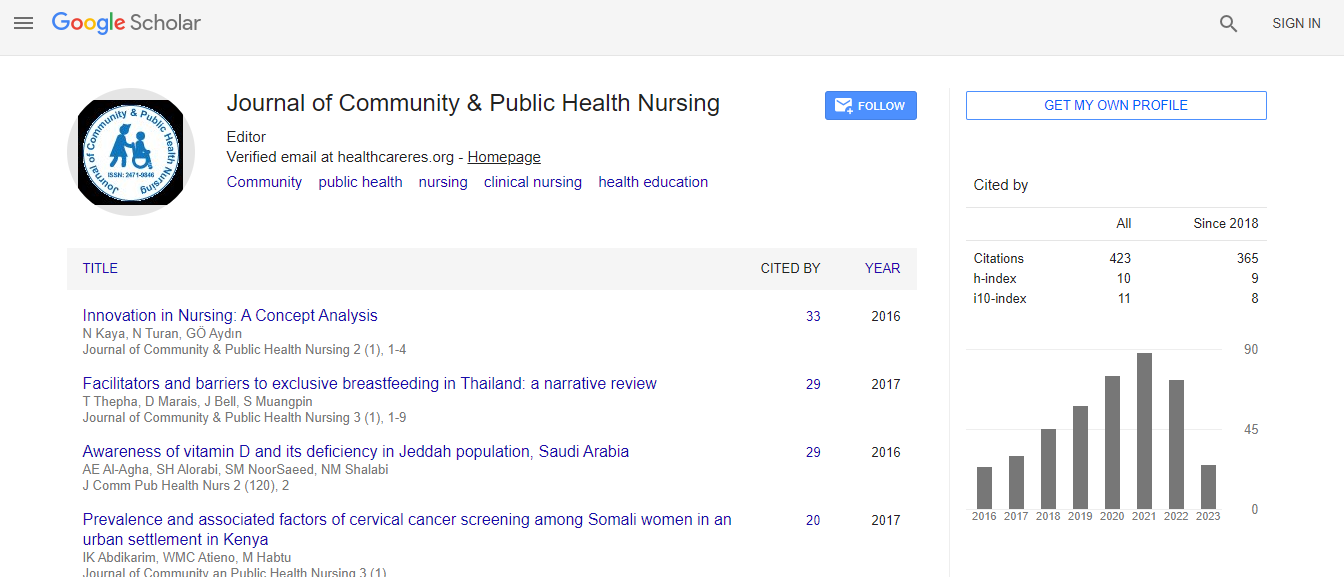Modification and Validation of Respiratory Health Questionnaire Derived from ST. George's Respiratory Questionnaire Abuja, Nigeria
*Corresponding Author: Christabel Ihedike, Faculty of Health Sciences& Wellbeing, University of Sunderland, UK, Email: christabelihedike@yahoo.comReceived Date: May 26, 2022 / Accepted Date: Jun 13, 2022 / Published Date: Jun 20, 2022
Citation: Ihedike C, Ling J, Mooney J (2022) Modification and Validation of Respiratory Health Questionnaire Derived from ST. George's Respiratory Questionnaire Abuja, Nigeria. J Comm Pub Health Nursing, 8: 348.DOI: 10.4172/2471-9846.1000348
Copyright: © 2022 Ihedike C, et al. This is an open-access article distributed under the terms of the Creative Commons Attribution License, which permits unrestricted use, distribution, and reproduction in any medium, provided the original author and source are credited.
Abstract
Respiratory questionnaires, such as St George’s Respiratory Questionnaire (SGRQ), are used to assess the nonrespiratory effects of COPD and other respiratory illnesses.
The SGRQ has been validated in more than 60 languages and has been widely used for quality-of-life assessment. However, several studies have identified that the SGRQ is too lengthy for easy use within a clinical setting and is often challenging to complete in low-literacy environments, including in many developing countries.
Objectives: The objectives of this study were to extract questions from SGRQ and develop a simple questionnaire to be used in areas where SGRQ is relatively new. Modify the reporting period, and assess the validity, and reliability of this modified version in a population of COPD and asthma patients in Abuja Nigeria.
Method: The questions were extracted from SGRQ and reviewed by the supervisory team and the pulmonologists. Participants are registered COPD and asthma patients registered in the two hospitals used for the study who were from an existing cohort used to study the effect of O3, PM10, and NOx on respiratory health in Abuja, Nigeria. Focus groups and interviews were conducted to explore the perceptions of patients and clinicians on the original and modified questionnaires using qualitative methods (thematic analysis).
Result: The modified version showed good internal consistency, test-retest reliability, and responsiveness was shown by significant changes in responses to the questions. In the participants’ opinion, the modified questionnaire can be successfully used as a respiratory questionnaire for adult COPD and asthma patients in Nigeria.
Conclusion: This modified SGRQ is a reliable, valid, and responsive instrument for the evaluation of respiratory patients in countries where SGRQ is relatively new such as Nigeria. We observed that the modified questionnaire is equivalent to other versions and can be used in countries where health-related questionnaire such as SGRQ is relatively new and or low literacy/developing countries.

 Spanish
Spanish  Chinese
Chinese  Russian
Russian  German
German  French
French  Japanese
Japanese  Portuguese
Portuguese  Hindi
Hindi 
